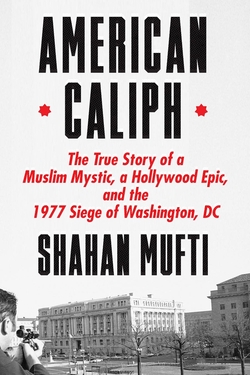 As with most episodes of only moderate political violence, the drama that took place over forty hours and three days, March 9-11, 1977, in various spots around central Washington, D.C., once dominated the news. Over time, however, it has dropped into the public's memory hole, in part due to its sheer complexity, what with multiple goals (avenging a family's murder, stopping an allegedly sacrilegious film from showing, fighting an alleged Jewish conspiracy) and multiple locations (a District of Columbia governmental building, the main mosque of Washington, the headquarters of B'nai B'rith International).
As with most episodes of only moderate political violence, the drama that took place over forty hours and three days, March 9-11, 1977, in various spots around central Washington, D.C., once dominated the news. Over time, however, it has dropped into the public's memory hole, in part due to its sheer complexity, what with multiple goals (avenging a family's murder, stopping an allegedly sacrilegious film from showing, fighting an alleged Jewish conspiracy) and multiple locations (a District of Columbia governmental building, the main mosque of Washington, the headquarters of B'nai B'rith International).
Fortunately, this episode has found its rightful chronicler in Mufti, a professor of journalism at the University of Richmond. He provides the full background of the siege, telling about the personalities, their ideologies, and the developments that climaxed in the death of two individuals, the injury of three, and the taking of over a hundred hostages. In particular, Mufti follows three narratives: the biography of Hamaas Abdul Khaalis (né Ernest Timothy McGhee, 1921-2003), caliph of the Hanafi Movement and perpetrator of the 1977 violence;[1] the saga behind the making of The Message: The Story of Islam, a feature movie made by Moustapha Akkad (1930-2005); and the evolution of the Nation of Islam from its mysterious beginnings to its split under Warith Deen Mohammed (1933-2008) and Louis Farrakhan (1930-).
Full and competent as Mufti's account is, it does not explain the Islamist ideology – so new to Americans in 1977 – that motivated Abdul Khaalis and the Hanafis. For example, the furious, conspiratorial, brutal treatment of Jewish hostages at B'nai B'rith seems to come out of nowhere, with the belief that they had been behind both the murder of Abdul Khaalis family members and the movie about Muhammad feeling somewhat arbitrary.
Not once but twice does Mufti state that his is "a work of journalism"; however, his many interviews, his deep research, and the many footnotes suggest American Caliph transcends journalism to become history, a precious document for understanding the turbulent career of Islam in the United States.
[1] Hamaas is an alternative spelling of Hamas, as in the Gazan Islamist group.